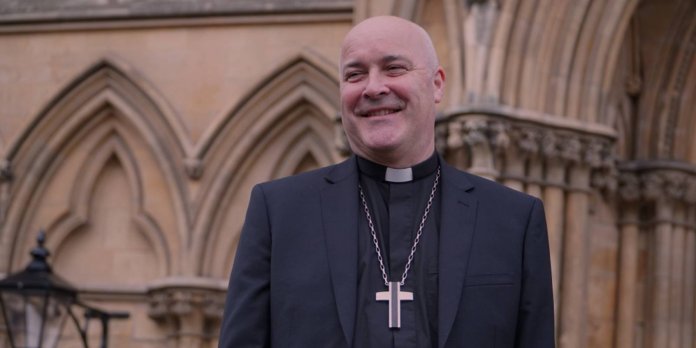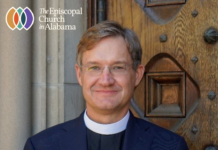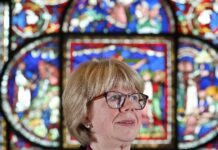I want this morning to make some brief reflections on how we live together in times of uncertainty – both the uncertainties that unbalance our life together in Christ and the uncertainties and divisions that we experience in the world.
Christ came to save us from this: to bind us together as one, uniting our life with his life and with him to the Father.
I am always particularly moved by those powerful words in the letter to the Ephesians, reminding us that Christ came to break down barriers of separation. “You who once were far off have been brought near by the blood of Christ. For he is our peace; in his flesh he has made us one and has broken down the dividing wall, that is, the hostility between us.” (Ephesians 2. 13-14)
Paul is writing about the Gentiles who have been brought into the new covenant that Christ has made possible. But this also implies to all the other division that can so easily separate us from one another and from God.
In thinking about this I have been enormously helped and inspired by the Roman Catholic Dominican, Timothy Radcliffe’s addresses to the recent Roman Catholic Synod, published under the title, ‘Listen to Him!’ For the Roman Catholic Church faces the same challenges that we face, risks the same divisions, desires the same unity.
Firstly, he quotes Jonathan Sacks, one time Chief Rabbi of Great Britain. He observed that in turbulent times – times like ours – there is an almost overwhelming temptation for religious leaders to be confrontational.
I am trying to resist this temptation, please pray for me. And please resist it yourself.
He notes that with this divisive mindset choices are nearly always set out as stark divisions. Not to condemn is to condone.
But he continues –
“A prophet hears not one imperative but two: guidance and compassion, a love of truth and an abiding solidarity with those for whom that truth has become eclipsed.
To preserve tradition and at the same time defend those others condemn is the difficult, necessary task of religious leadership in an unreligious age.”
These words feel to me to be relevant for my own stewardship of this Diocese of York, for our responsibilities as this Diocesan Synod, for our discussions later this morning about LLF [Living in Love and Faith], but also for the huge challenges facing our world, particularly in places such as Israel and Gaza, South Sudan, Yemen and Ukraine. Or when we consider our own government’s, in my view, hasty and unhelpful expanding of definitions around extremism.
We easily rush to counting people out, rather than finding space to include them in – even with their different opinions, perspectives and traditions.
Christopher Butler, a Roman Catholic bishop and Benedictine Monk at the Second Vatican Council was often heard to say, “Let us not fear that truth can endanger truth.”
What I think he means by this is that within the body of Christ we can find ourselves, sincerely and prayerfully, seeing the truth and where God is leading us in ways that may be even radically different. So, first of all, before being quick to condemn or exclude, we must open our hearts and minds to the spaciousness of the divine truth. This is not to say that something is true, just because someone says it is or thinks it is, but to be open to the possibility of a deeper truth that both transcends our current positions, and leads us to those new places that we often see in scripture, such as when Paul says that he opposed Peter face to face (see Galatians 2.11) or when the early Councils of the Church found themselves making momentous decisions about what it meant to be in Christ and the implications of this in the lives of new, gentile believers.
And Pope Francis himself has said, there is no greater freedom than that of allowing oneself to be guided by the Holy Spirit, renouncing every attempt to plan and control everything to the last detail, and instead, letting the Spirit enlighten, guide, and direct, leading us wherever God wills, and sometimes into new truths, which then turn out to have been the truth all along.
I don’t know. And that is the point. We need time and spaciousness to discern the mind of Christ, and we must avoid being too quick to exclude or condemn, and always pay attention to what unites us rather than what could divide.
This is hard, but if we pray for the grace to see Christ in each other, and if we resist the temptation to count each other out, and if we are able to see and seek to learn from the different insights of different people and groups then I trust and believe that God the Holy Spirit will lead us to a place where we can inhabit the church with our differences (as we have generally been so good at in the past, and as is deeply embedded in our Anglican tradition) and find ways of continuing to lead a common life. And even show the world a better story of peace.
And it is for that great longing for peace and justice that I want to end.
This week some concerns have been expressed around the Church Commissioners’ decision to create a fund for Healing, Repair and Justice, following the forensic examination of its historic accounts and the detailed knowledge that between 500 million and one billion pounds of its historic endowment comes directly from transatlantic chattel slavery.
This means for many of us, me included, that when our salaries or stipends are paid, when link money is given to poor parishes, when strategic investment money is granted to dioceses, some of that money – quite a bit of it, in fact – has been earned, quite literately, off the back of enslaved human beings.
That poses some fundamental questions. How do we feel about this? What should we do?
Shrug our shoulders and say it is all in the past, that nothing is to be done? Or face those difficult and divisive moments in our history, recognise our share in a terrible evil and acknowledge its continuing impact in people’s lives today and – as we are proposing, and I believe should be proud of – set up a fund that can help build a better future.
The sum set aside for this is £100 million – still a lot of money – but not the billion that has been inaccurately reported in bits of the media and social media. Yes, it is hoped that other institutions will examine their own accounts and join this fund. But even if this doesn’t happen, we are making a significant contribution towards healing and repair.
We are creating a space where we can be honest about our mistakes, particularly the way we failed to see that a false and damaging theology was allowing us to consider some human beings as less than human. So much so that their very lives could be bought and sold for our profit. Profits we are still benefiting from today. Why, even when slavery ended it was the slaveowners who were compensated, not the slaves who were set free.
You will notice that I am deliberately using the language of ‘us’ and ‘our’ because even though obviously in 2024 we cannot be directly morally responsible for what our forebears did in previous centuries, we do bear moral responsibility for what we do now with the wealth that we have directly inherited from them — and for the Church of England that means a large and still identifiable part of our centrally-held assets.
But acknowledging the huge pressure that parishes in this diocese are under, and how as a diocese we struggle to support ministry in the ways we wish, I understand that some people are saying, why can’t this money be given to us?
Let me remind you of the billions the Church Commissioners do give to support mission and ministry; of the successful £570,000 bid towards our Living Christ’s Story strategy that we learned of last week, of which over £300,000 is for Hull. This is very encouraging news. I believe there is more to come. Let me also assure you that I , with others, will be supporting further conversations that may lead to an even greater levelling up of support for the poorest parishes in our nation, many of which are in our diocese.
But this can never be one thing or the other. We cannot be a church for ourselves. We must be the church for others, the church of Jesus Christ. Therefore, we must seek justice; we must be penitent when we get things wrong; we must try to make amends. And if we do this, I believe every parish will benefit, because the world will see the Church trying to tell different story. Not a story of division. Not a story of hatred. Not a story that pretends things cannot change. But a story that is open to the new truths and new insights which led the Church itself to be part of the movement to abolish slavery, as well as the body that had profited from it. That took the Christian faith across the world and brought people the life-giving good news of the gospel of Christ – not something we need to apologise for.
We continue to do this today, here in our diocese and everywhere: living Christ’s story; letting His story shape our story.
I believe that when the world sees the Church living out its story of peace and reconciliation, people will be much more likely to ask, and hear eagerly and thirstily, where this message comes from: which is not our own wisdom; but what God gives us in Jesus, for we are all sinners in need of his grace, beggars crying out for bread, and therefore, with all our differences, sisters and brothers in Christ.
He is our Father. Not mine.



